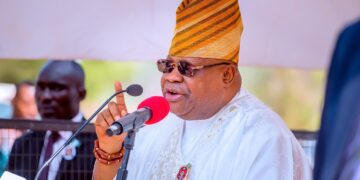In the crucible of public scrutiny, high-ranking officials face intense pressure, with every move subject to partisan criticism. A case in point is Rt. Hon. Femi Gbajabiamila, Chief of Staff to President Bola Ahmed Tinubu, whose recent tour of government agencies has sparked a maelstrom of reactions.
Gbajabiamila’s visits to key agencies like the National Agricultural Land Development Authority (NALDA), the Bureau of Public Procurement (BPP), and the Nigeria Atomic Energy Commission (NAEC) among others have ignited fervent debates about his motivations, the legitimacy of his actions, and their far-reaching implications for governance. Contrary to perceptions of mere symbolic gestures, agency heads received prior briefings from the Permanent Secretary of the State House, outlining the purpose and objectives of these visits.
The briefing emphasised that Gbajabiamila’s tour is a critical component of a comprehensive initiative to ensure stringent compliance with regulations, guidelines, and the Public Service Rules (PSR). The primary goal is to guarantee adherence to rules governing employment, promotions, administrative processes, and operational frameworks.
Gbajabiamila’s effort seeks to bolster regulatory adherence, enhance governance, and ensure optimal performance across agencies. This pragmatic measure ensures agencies operate within their mandates, delivering efficiently on their roles and responsibilities.
Rather than usurping power or overstepping boundaries, Gbajabiamila’s visits aim to reinforce accountability, transparency, and adherence to regulations. By contextualising these visits within President Tinubu’s Renewed Hope Agenda, it becomes evident that Gbajabiamila’s initiative aligns with the administration’s commitment to enhancing governance, productivity, and service delivery.
When high-ranking officials take proactive measures, exceeding their customary responsibilities to ensure seamless government functioning, it warrants recognition. However, in our context, such dedication is seldom exhibited. Regrettably, our nation has been plagued by a dearth of officials willing to take the initiative, as exemplified by the Chief of Staff’s unprecedented visit to agencies under the presidency.
This bold step merits commendation and acknowledges the CoS’s commitment to enhancing governance. Unfortunately, doing extra to ensure our nation’s functionality has not been a hallmark of most officials, fostering a culture where individuals prioritize personal interests and engage in unscrupulous practices.
Critics have swiftly raised concerns about the motivations behind Gbajabiamila’s visits, suggesting an unwarranted expansion of executive authority. However, a diligent examination of the incident raises two pivotal questions: Was this an oversight on the part of the CoS? Did Gbajabiamila’s presence undermine the National Assembly’s oversight functions? Emphatically, the answer to both is “NO”.
This leads to further inquiry: Is Gbajabiamila’s action a genuine endeavour to bolster productivity and accountability? Should we rally behind initiatives promoting transparency and good governance? Unreservedly, the response to both is “YES”.
As Chief of Staff, Gbajabiamila’s role encompasses administrative facilitation and strategic guidance in executing presidential directives, ensuring seamless implementation and optimal outcomes. His visits to agencies demonstrate a commendable dedication to augmenting performance and accountability within the executive branch, aligning with President Tinubu’s Renewed Hope Agenda.
The suggestion that Gbajabiamila’s actions might infringe upon the National Assembly’s oversight responsibilities is misguided. The National Assembly remains the paramount institution entrusted with legislative oversight, exercising its constitutional mandate to scrutinize and hold the executive branch accountable. Gbajabiamila’s role is complementary, and focused on enhancing effectiveness and efficiency.
His initiatives aim to streamline processes, bolster accountability, and ensure alignment with the presidency’s vision. Far from diminishing the National Assembly’s oversight functions, Gbajabiamila’s actions represent a laudable effort to harmonize the executive’s performance with the presidency’s and the Nigerian people’s expectations.
By promoting transparency, accountability, and good governance, he reinforces the National Assembly’s oversight role, fostering a collaborative environment conducive to effective governance. Criticism often accompanies actions by public figures, but in this case, attempts to cast Gbajabiamila’s visits in a negative light exemplify double standards in political discourse.
Engaging with public agencies to enhance performance and ensure adherence to regulations is a necessary component of good governance, not an act of pride or ego. The recent uproar from vocal critics should be recognized as a calculated effort to sow discord between the executive and legislative branches, undermining the Renewed Hope Agenda and jeopardizing the harmonious relationship between the two arms.
Gbajabiamila’s actions should be celebrated as a beacon of hope, illuminating the path to enhanced productivity, accountability, and transparency within the executive branch. His agency visits embody a leadership style that prioritises substance over rhetoric and results over words. Rather than being perceived as a threat, his initiatives should be applauded for complementing the National Assembly’s role and strengthening governance.
The criticism levelled against him appears to be a thinly veiled attempt to undermine his progress, driven by political expediency rather than genuine concerns. Despite the cacophony of dissenting voices, the truth remains: Gbajabiamila is a steadfast servant of the people, committed to augmenting productivity and service delivery.
As Chief of Staff, his singular focus is to provide unwavering support and enhance the operational efficacy of public agencies, aligning with President Tinubu’s vision for a more efficient governance structure. It’s time to let Gbajabiamila continue his work without hindrance, as President Tinubu’s trust in him is unwavering.
Let’s shift our focus to the intrinsic merits of Gbajabiamila’s actions and their potential benefits for the nation, rather than being swayed by partisan criticisms and divisive rhetoric. His visits to public agencies represent a significant step forward, exemplifying proactive leadership that deserves our encouragement.
Gbajabiamila’s commitment to Nigeria’s progress is unwavering, and he deserves our support, not criticism. As we strive towards a prosperous Nigeria, let’s renounce divisive rhetoric and embrace constructive criticism that fosters national growth, development, and unity. By doing so, we can create a harmonious environment conducive to effective governance and accountability.
Muazu is a public affairs analyst writing from Bauchi.








